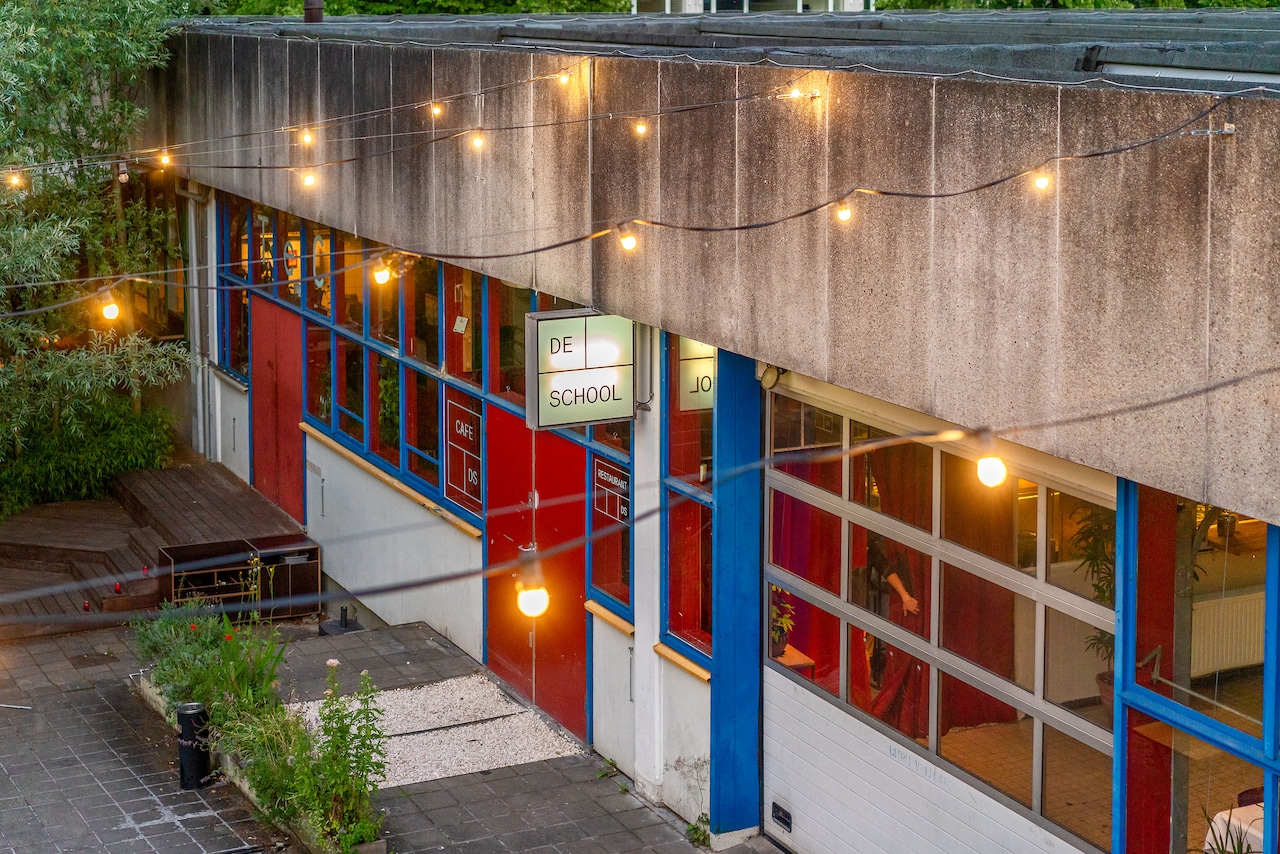This article was written and curated by the TicketSwap team, translated for you with AI.
Leaving De School after the last, lastest, and then the actual last record, back on Monday, January, 15, was tough.
When the doors opened one last time to let dancers back into the world, snow started falling down for the first time that weekend like a dramatic touch by nature to harden the blow.
To paint a picture of how much this club was loved: people were queuing outside in the Dutch winter for over eight hours straight to try and get a door-sale ticket, they built campfires to keep themselves warm, and even climbed over the roof of the building to try and get in (without success).
Achieving world peace single-handedly would be easier than getting a ticket to ‘Het Einde (The End)’. All the club’s darlings were invited to play this non-stop weekender of saying goodbye and saying hello to all the friends we’ve made along the way. It’s hard to name a more iconic club than Amsterdam’s De School. Obviously, the previous Club 11 and Trouw Amsterdam from the same team come close, but otherwise, there was no other place that was as ferociously filthy and beautifully warm at the same time.
It’s also far from easy to even begin to describe this club, that was only meant as a momentary capsule of time, and where no photography was allowed – let alone begin to mourn the place that lives only in clubbers’ hearts and our faded memories.
The making of an archive
‘Het Archief’(The Archive) is a project that tries to visualize those feelings of yearning for something that’s no longer here, warping us back into those emotional and sometimes hazy moments with over 900 recorded sets played in that enigmatic building with a 24-hour permit.
But how do you even begin to work on something this big? And, the question most heard after De School’s permanent closing is, where do we go now, especially this ADE?
The old technical, Christian school building in Amsterdam district, Nieuw-West, opened its doors in 2016. Because of the pandemic, but mainly a massive turnaround in the club's work ethic, general culture, and criticism about the lack of diversity on the team, the doors closed in 2020. It reopened in 2022, much to the relief of Amsterdam’s alternative club scene, with the bittersweet understanding that the club would close permanently in January 2024.
De School was never meant to stay open forever. Although most people hoped it would, the club owners had a clear vision: end on a high note. The best way to stay in people’s minds forever is to create something temporary.
Sneaking in to go out
Jasmín is a Dutch powerhouse DJ who has built a strong career for herself and was tasked with building ‘Het Archief’, both which started in this particular club. Originally from Enschede and studying in Utrecht at the time, Jasmín would just take a night train back home after going out all night at De School. ‘It didn’t really matter who was playing there, I would still go. You had to be 21+ to enter, but I would be allowed in because I volunteered as a Communications Manager for De School. Hearing all those different styles of music has shaped me musically.’
Jasmín had already DJ’ed for a while at that point, so it was only a matter of time before she would play there, too. ‘My first set at De School was during ADE, and I remember feeling so overwhelmed. It’s such a special place and since I worked there and all my friends were regular visitors, I knew everyone in the room, which made my nerves worse.’ It all worked out, because Jasmín would go on to play there more than any other club she’d ever play at, and she continues to grow as an artist.

The void that De School left is still palpable, says Jasmín. ‘Especially when artists would play deeper and trippier sounds on that fantastic sound system in the basement, I felt like I was alone in the club, in a good way. Sometimes I did go out alone, and entering the basement almost felt like a tunnel where you could completely disappear. I would drift through all the nooks and hallways when I was looking for another sound to fit my mood. At De School, there was always more.’
She describes the club as a twilight zone, where artists would get literal and figurative space to experiment. Artists wouldn’t get booked to play a specific genre, but because the team behind the club believed in their qualities.
“Surprise, eight years of music just dropped!”
So, after these years of ongoing club nights, ever-lasting weekenders, and art fairs, it’s no surprise many now well-known DJs sparked their careers there, and miss the place for the freedom it gave them. The good news is that recently, the municipality of Amsterdam decided to work with a team closely knit to De School, launching a digital, sonic archive together called ‘Het Archief’.
Funding also came through Podiumkunst.net and Mixcloud, where the sets are hosted. In classic De School style, a message appeared on the social media account in June without warning, stating the release of all of those 900+ sets all at once.
But… how do you even begin to archive that many sets, moments, tears, and sweat drops? Melisa Cenik came up with the idea, says Jasmín, who gives credit where credit’s due. Cenik mostly worked at Dekmantel, besides many other electronic music projects, where she started as a trainee in 2016 and headed to Head of Marketing & Communications later. For De School, Cenik asked Jasmín to be her partner in crime for a project where she many, many times asked herself where she got herself into.
Jasmín: ‘De School’s team recorded a lot of sets from the beginning in 2016, because they had to pay rights over the music they played. Nothing was ever done with those sets, until De School reopened its doors and Melisa came up with the idea to create a digital archive, which she had some experience with from her time at Dekmantel.’
The pair made a plan, which turned out to be hard to execute. ‘In the beginning, you could hear DJs mix into each other’s sets when they took over, so it was almost impossible to tell who was playing, or where our team would have to cut the music.’ So what do you do then?
Well, you call all of the artists. 'Because I worked on the social media announcements for De School, I could remember a lot of lineups. I tried to fill in the gaps and started making a call-list, so we could check with the artists which set was theirs.' Jasmín also explains that some artists sometimes said it wasn't even their set when they called someone, reflecting the sheer amount of musical data to untangle.
'We called everyone whose set we could find to ask for consent to publish, and most people said yes. Some said no because they felt the moments couldn't be re-lived, or simply because they didn't like their own sets.' Besides calling, messaging, and many of moments of flustered stress, everything that was on Melisa, Jasmín, and the team's minds was collected into one big spreadsheet.
Once last round through the hallways
The end result? A beautiful map of the old school building, where you can digitally roam through all the classrooms, pick your favorite spot and explore all sets by year or by weekender. Jasmín's sets are also included in the archive, from her first set in the basement to her emotional set during 'Het Einde' surrounded by all her friends.
'When I listen back to my own sets, I sometimes don't even recognize the tracks anymore. Obviously, the recordings reflect a club, which is much livelier than a radio set. You'll hear people coming to the booth, or the sound getting louder and louder and then dropping – in that moment in the club, stuff like that's iconic.'
She learned a lot about herself during this project and about archiving itself, including sustainable archiving, working through immense chaos, and how all DJs are just big music nerds, in the end.
When asked if Jasmín still misses De School, eight months later, the answer is yes, very much so. ‘I’ll always cherish moments like Marcel Dettman’s set in the basement, or Call Super who played a morning set in Muzieklokaal. Another highlight was the night I got to play with Kode9 and SHERELLE – there’s still no other place in Amsterdam that offers artists this much opportunity to experiment and grow. I wish I could have explored that for a bit longer, and that I would’ve had the opportunity to play more rooms and time slots there. De School made people play very differently from how they would normally play, which made it fantastic. It’s so nice to listen to those recordings when you miss the club.’ Jasmín and Melisa will host a panel during ADE called ‘Het Klaslokaal’ (The Classroom), diving into De School’s digital sound archive and new ways of archiving.

Where to party if you’re missing De School this ADE 2024
Is the gaping hole in your heart still there after all those months? Listen through De School’s best moments from 2016 – 2024 online, or try to get a copy of the soon-to-be-launched book ‘HET ALTIJD’.
...and if nothing else works; here’s six recommendations to go to this ADE, where undoubtedly dozens of new friends and memories to be made await.
Breakfast Club ADE Triathlon: RADION Saturday | ADE 2024
First tip-off? Head to Radion, where Breakfast Club touches down on the Saturday of ADE, next to VAULT SESSIONS from Sunday deep into Monday.
One Eye Witness: DJ Masda • Kyra Khaldi • Rey Colino | ADE 2024
Radio Radio is doubtlessly much smaller and only has one room, but if you look closely, you’ll find a lot of De School’s regulars there. For example on ADE Wednesday, when One Eye Witness takes over with head honcho Rey Colino.
POLIFONIC X LOVE ON THE ROCKS SHOWCASE | ADE 2024
Skatecafe joins ADE for the first time, and if this lineup doesn’t scream De School, we don’t know which one will. Alex Kassian, Interstellar Funk, Jennifer Loveless, Paramida, Sandrien, and many more play on ADE’s Thursday, soundtracking the many cool spaces in Skatecafe.
United Identities x Doka Studio
CARISTA was one of three who closed down De School’s Muzieklokaal on Monday morning, and everyone who was there will most likely never forget that set. Catch her at Doka during ADE, where she takes over the dark room club with her label United Identities on ADE Thursday.
Strangelove ADE 2024
Job Jobse, the other ultimate De School darling, takes his Strangelove night to nightclub Bajes, where KI/KI and Palms Trax also host takeover nights. Although the place doesn’t exist anymore, the residents are still going strong.




